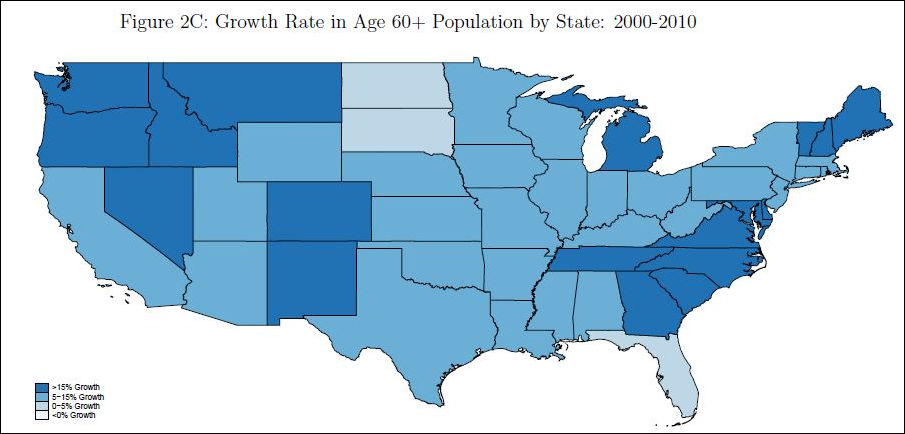
Source: “The Effect of Population Aging on Economic Growth, the Labor Force and Productivity.” (Click for more legible image.)
by James A. Bacon
Why is U.S. economic growth slowing? Perhaps for the same reason economic growth is slowing in Europe, Japan and other advanced economies — our populations are getting older. That was a major theme of my book “Boomergeddon,” written in 2010, when I accurately predicted that U.S. economic growth would fall short of the optimistic expectations in U.S. eonomic and budget forecasts. I don’t pretend I got everything right — I failed to foresee the fracking boom that ignited the U.S. energy boom, and I did not anticipate how quantitative easing would goose goosing the economy by inflating asset values. But I was pretty certain about one thing — the U.S. population was getting older, and an older population would dampen economic growth.
That’s not a controversial view among the handful of economists who study the impact of aging. It just isn’t appreciated by the broader economic profession, the geniuses who have consistently overshot economic growth forecasts over the past decade, or a political class that has shown no willingness to put entitlements and debt accumulation on an economically sustainable basis.
Now comes a study, “The Effect of Population Aging on Economic Growth, the Labor Force and Productivity,” by Nicole Maestas, Kathleen J. Mullen, and David Powell, and published by the National Bureau of Economic Research. Their disturbing conclusion: “We find that a 10% increase in the fraction of the population ages 60+ decreases the rate of GDP per capita by 5.5%. … Our results imply annual GDP growth will slow by 1.2 percentage points this decade and 0.6 percentage points next decade due to population aging.”
Extrapolating from differential rates of aging and economic growth in the 50 states, the authors see a number of forces at work. Slower growth in the workforce accounts for about one-third of the effect. The rest comes from slower productivity growth from an aging workforce, with possible spillover affects among younger workers.
The fraction of the United States population 60 or older will increase by 21% between 2010 and 2020, and by 39% between 2010 and 2050. This dramatic shift in the age structure of the U.S. population — itself the effect of historical declines in fertility and mortality — has the potential to negatively impact the performance of the economy as well as the sustainability of government entitlement programs.
We can argue over the impact of taxes, regulation, quantitative easing, fiscal policy, and most will retreat into our respective ideological corners, agreeing upon nothing. But the aging of the population is an undeniable phenomenon that transcends partisan analysis. And there is consensus in the economic profession that once a tipping point is reached — as it has in many countries — the economic impact is negative. The U.S. and other aging countries which once had the demographic wind at their back now are leaning into a gale. None are likely to return to the economic growth rates of the early post-World War II era.
Virginia impact. Sadly, the paper did not provide a state-by-state breakdown for aging. However, two maps in the appendix (including the one above) show that Virginia’s population aged more rapidly than that of most other states between 1990 and 2000, and again between 2000 and 2010. One could conjecture that the aging effect has dampened economic growth here somewhat more than the national average. There may be more to blame for Virginia’s economic sluggishness than federal sequestration or flawed public policy.
No one can foresee the future, but if there is one aspect of the future that is predictable with some reliability, it is a nation’s (or state’s) demographic profile. And if there’s one thing we can say with some certainty, it is that economic growth will be slower. Our elected leaders should bear in mind as they discuss expanding entitlements and taking on more debt. No miraculous resurgence of economic growth will make it easier to pay our bills.
When the political class ignores this advice, don’t say I didn’t warn you.


